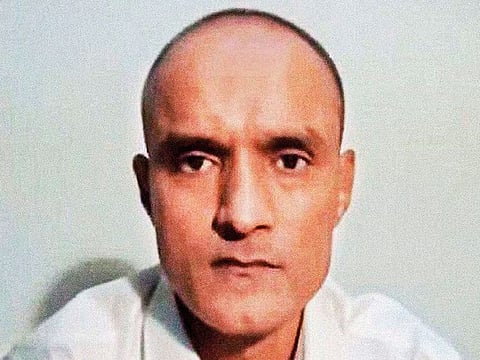The case of Kulbushan Jadhav in Pakistan: Everything you need to know
India’s deputy high commissioner to Pakistan Gaurav Ahluwalia meets Jadhav

Dubai: India's Ministry of External Affairs has accepted the consular access offered by Pakistan to death-row inmate Kulbhushan Jadhav.
According to media reports, India’s deputy high commissioner to Pakistan Gaurav Ahluwalia Monday met Jadhav, who is on death row in Pakistan, after Islamabad granted consular access to the former naval officer “in line with the ICJ judgement”.
Tweep @ramapriya1989 posted: “100 criminals may escape, but one innocent should never be punished. I appreciate the way [the Indian] government is handling Kulubhushan Jadav case and pray for his safe return. India is with you.”
Who is Kulbhushan Jadhav?
The Pakistan government has alleged that Jadhav is an Indian spy who was a serving commander in the Indian Navy and involved in subversive activities inside Pakistan.
He was arrested in the Pakistan’s province of Balochistan on charges of terrorism and spying for India’s intelligence agency, the Research and Analysis Wing. This happened on March 3, 2016 during a counter-intelligence operation.
On April 10, 2017, Indian Foreign Ministry said he had been “kidnapped [in 2016] from Iran and his subsequent presence in Pakistan has never been explained credibly”.
The Indian government recognised Jadhav as a former naval officer but denied any current links with him and maintained that he took premature retirement and was abducted from Iran.
Pakistan Foreign Ministry tweets
Pakistan Foreign Ministry spokesperson Mohammad Faisal posted earlier today on Twitter: “Consular access for Indian spy Commander Kulbhushan Jadhav, a serving Indian naval officer and RAW operative, is being provided on Monday, September 2, 2019.”
He said the consular access would be given in line with the Vienna Convention on Consular Relations, based on the recent judgment of the International Court of Justice at The Hague, United Nations, and the laws of Pakistan.
The tweet further added: “Commander Jadhav remains in Pakistan’s custody having been convicted for his involvement in espionage, terrorism and sabotage.”
This is the second such meeting
Twitter users in India shared news reports of the meeting that came a month after a similar interaction between Indian officials and Jadhav did not materialise amid differences between New Delhi and Islamabad on the terms of the consular access to the retired Indian navy officer.
India reminded Pakistan that the consular access to be granted to Kulbhushan Jadhav should be free and without restrictions.
Kulbhushan Jadhav in Pakistan: Timeline
On April 10, 2017, Jadhav was sentenced to death by a Field General Court Martial in Pakistan.
On May 18, 2017, the International Court of Justice stayed the execution pending the final judgement on the case.
On July 17, 2019, the court rejected India’s appeal for Jadhav’s release and ordered Pakistan to suspend the execution. It ruled that Pakistan will have to review the entire process of trial and conviction of Kulbhushan Jadhav and provide India with consular access.
Indian journalist @AdityaRajKaul posted earlier today: “Govt Sources: India has been seeking consular access to Kulbushan Jadhav for last 3 years. Matter of denial of consular access was taken to ICJ by India. ICJ gave a unanimous decision in favour of India. Today, after victory India will be proceeding for consular access to Jadhav.”
What is consular access?
Vienna Convention on Consular Relations of 1963 defines consular relations between independent states and a consul, who is a representative of a foreign state in a country and works for the interests of his countrymen in the host country.
As per Article 36 of the Vienna Convention, the host country has to notify the foreign embassy or the consulate if any national from that country is detained or arrested. On the request of the detained/arrested person, the police is required to fax the notice of the arrest to the embassy or consulate.
The arrested national has the right to regular consultation with the officials of their consulate during his or her detention and trial.
Sign up for the Daily Briefing
Get the latest news and updates straight to your inbox






